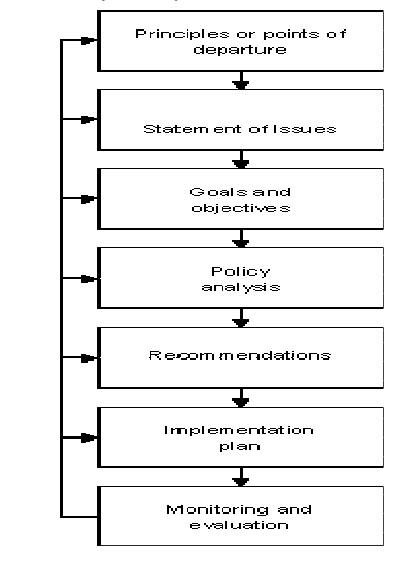Chapter: Principles of Management : Planning
Planning Policies
POLICIES
Policies are general statements or understandings that guide managers’ thinking
in decision making. They usually do
not require action but are intended to guide managers in their commitment to
the decision they ultimately make.

The first
step in the process of policy formulation, as shown in the diagram below, is to
capture the values or principles that will guide the rest of the process and
form the basis on which to produce a statement of issues. The statement of
issues involves identifying the opportunities and constraints affecting the
local housing market, and is to be produced by thoroughly analyzing the housing
market. The kit provides the user with access to a housing data base to
facilitate this analysis.
The
statement of issues will provide the basis for the formulation of a set of
housing goals and objectives, designed to address the problems identified and
to exploit the opportunities which present themselves.
The next
step is to identify and analyze the various policy options which can be applied
to achieve the set of goals and objectives. The options available to each local
government will depend on local circumstances as much as the broader context
and each local authority will have to develop its own unique approach to
addressing the housing needs of its residents.
An
implementation program for realizing the policy recommendations must then be
prepared, addressing budgetary and programming requirements, and allocating
roles and responsibilities. Finally, the implementation of the housing strategy
needs to be systematically monitored and evaluated against the stated goals and
objectives, and the various components of the strategy modified or
strengthened, as required.
At each
step of the way, each component of the strategy needs to be discussed and
debated, and a public consultation process engaged in. The extent of
consultation and the participants involved will vary with each step.
Essentials of Policy Formulation
The
essentials of policy formation may be listed as below:
A policy should be definite, positive and clear.
It should be understood by everyone in the organization.
A policy should be translatable into the
practices.
A policy should be flexible and at the same time
have a high degree of permanency.
A policy should be formulated to cover all
reasonable anticipatable conditions.
A policy should be founded upon facts and sound
judgment.
A policy should conform to economic principles,
statutes and regulations.
A policy should be a general statement of the
established rule.
Importance of Policies
Policies
are useful for the following reasons:
They provide guides to thinking and action and
provide support to the subordinates.
They delimit the area within which a decision is
to be made.
They save time and effort by pre-deciding
problems and
They permit delegation of authority to mangers
at the lower levels.
Related Topics